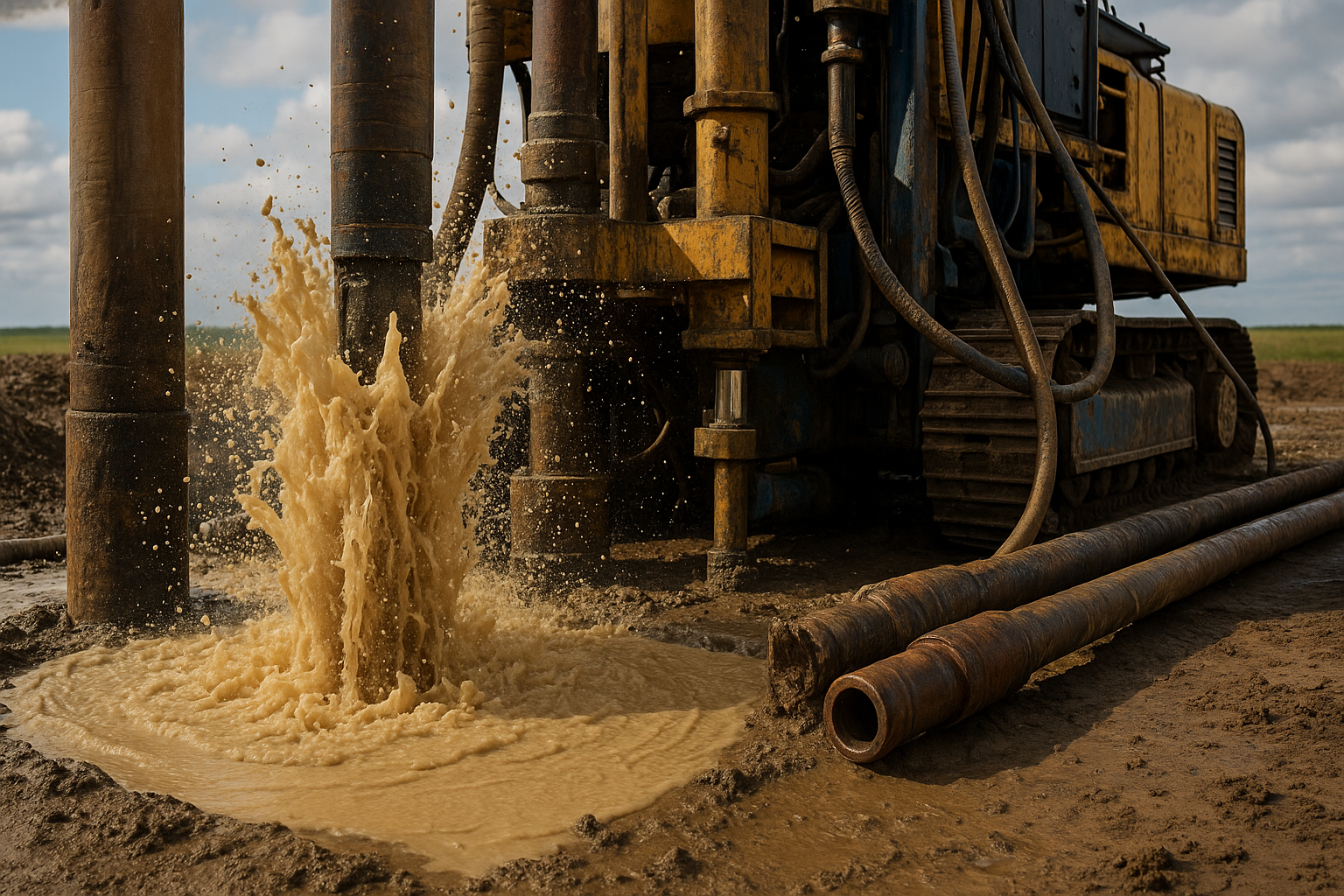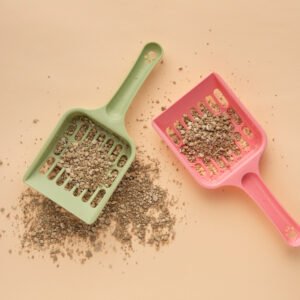When drilling operations reach challenging formations or encounter complex geological conditions, specialized materials become critical for success. IOP Bentonite stands out as one of the most important drilling fluid additives, offering unique properties that make it ideal for specific drilling applications. This comprehensive guide explores what IOP Bentonite is, how it functions in drilling operations, and why it has become a preferred choice for many drilling professionals.
Understanding IOP Bentonite: The Basics
IOP Bentonite refers to Iron Oxide Polymer modified bentonite, a specialized clay mineral that has been chemically treated to enhance its performance characteristics. Its high swelling capacity, ion exchange properties, and thixotropy make it valuable in industries like drilling, papermaking, and cosmetics.
This clay mineral belongs to the smectite group and is primarily composed of montmorillonite. What sets IOP Bentonite apart from standard bentonite is the presence of iron oxide polymers that modify its structure and performance characteristics. These modifications create a material with superior drilling fluid properties compared to regular bentonite.
The development of IOP Bentonite came from the need to address specific challenges in drilling operations where conventional bentonite fell short. Standard bentonite, while effective in many applications, sometimes lacks the stability and performance required in high-temperature, high-pressure environments or when dealing with contaminated drilling fluids.
Key Characteristics of IOP Bentonite
IOP Bentonite possesses several distinctive features that make it valuable for drilling operations:
Swelling Properties: Bentonite properties include the ability to expand to ten times its volume when completely hydrated. This characteristic is particularly pronounced in IOP Bentonite due to its modified structure.
Viscosity Control: The iron oxide polymer modification allows for better viscosity control across varying temperature ranges and contamination levels.
Thermal Stability: IOP Bentonite maintains its properties at higher temperatures compared to standard bentonite, making it suitable for deeper drilling applications.
Chemical Resistance: The polymer modification provides better resistance to chemical contamination from drilling fluid additives and formation fluids.
How IOP Bentonite Works in Drilling Operations
Understanding how IOP Bentonite functions in drilling requires examining its behavior at the molecular level and its interaction with drilling fluids. The mechanism of action involves several key processes that occur when the bentonite comes into contact with water and other drilling fluid components.
Hydration and Swelling Mechanism
When IOP Bentonite contacts water, the clay platelets begin to hydrate. Water molecules penetrate between the clay layers, causing the structure to expand. The iron oxide polymers in IOP Bentonite create additional binding sites for water molecules, leading to controlled swelling that produces the desired rheological properties.
It creates a very viscous, slippery, almost gel-like slurry that acts as a lubricant. This gel-like consistency is crucial for drilling operations as it helps suspend drill cuttings and provides the necessary hydraulic pressure to maintain wellbore stability.
Thixotropic Behavior
One of the most important characteristics of IOP Bentonite in drilling applications is its thixotropic behavior. This means the material becomes less viscous under stress (such as when being pumped) but regains its gel strength when at rest. This property is essential for drilling operations because:
- The drilling fluid can flow easily through the drill string and bit nozzles under pumping pressure
- When circulation stops, the fluid gels quickly to suspend cuttings and prevent them from settling
- The gel strength helps maintain wellbore stability during connections and other non-circulating periods
Formation of Filter Cake
IOP Bentonite plays a crucial role in forming a low-permeability filter cake on the wellbore wall. When the drilling fluid contacts permeable formations, the liquid phase filters into the formation while the clay particles build up on the surface. The iron oxide polymers in IOP Bentonite create a more uniform and lower permeability filter cake compared to standard bentonite.
This filter cake formation serves multiple purposes:
- Reduces fluid loss to the formation
- Stabilizes the wellbore wall
- Prevents formation damage
- Maintains hydrostatic pressure
Applications of IOP Bentonite in Different Drilling Scenarios
IOP Bentonite finds applications across various drilling operations, each taking advantage of its unique properties. The choice to use IOP Bentonite often depends on specific drilling conditions and challenges.
Water Well Drilling
In water well drilling, IOP Bentonite serves as the primary component for drilling fluid formulation. The enhanced stability of IOP Bentonite makes it particularly suitable for wells in unconsolidated formations where maintaining wellbore integrity is critical.
The material helps create stable drilling fluids that can effectively remove cuttings while preventing formation collapse. Its improved thermal stability makes it suitable for deeper water wells where temperatures may be higher than surface conditions.
Oil and Gas Drilling
Bentonite is widely used as a mud constituent in oil and water well drilling. In oil and gas operations, IOP bentonite is preferred where conventional bentonite may fall short, making it a reliable choice for oil drilling bentonite applications.
The enhanced properties of IOP Bentonite make it valuable in:
- High-temperature drilling environments
- Formations with high salt concentrations
- Wells requiring extended drilling fluid life
- Operations where fluid loss control is critical
Directional and Horizontal Drilling
The superior rheological properties of IOP Bentonite make it well-suited for directional and horizontal drilling applications. These operations require drilling fluids that can effectively clean the wellbore and transport cuttings over long horizontal sections.
The thixotropic properties of IOP Bentonite help maintain hole cleaning efficiency while providing the necessary suspension properties during periods of non-circulation.
Comparing IOP Bentonite to Standard Bentonite
While both IOP Bentonite and standard bentonite share the same basic clay mineral structure, the iron oxide polymer modification creates significant differences in performance characteristics.
Performance Advantages
IOP Bentonite offers several advantages over standard bentonite:
Temperature Stability: The polymer modification provides better performance at elevated temperatures, with less degradation of rheological properties.
Contamination Tolerance: IOP Bentonite shows better resistance to contamination from cement, salt, and other drilling fluid additives.
Filtration Control: The modified structure creates more effective filtration control with lower fluid loss rates.
Gel Strength Development: IOP Bentonite develops gel strength more quickly and maintains it better under varying conditions.
Cost Considerations
While IOP Bentonite typically costs more than standard bentonite, the improved performance often justifies the additional expense. The enhanced properties can lead to:
- Reduced drilling fluid maintenance costs
- Fewer drilling problems
- Improved drilling efficiency
- Better wellbore stability
Technical Specifications and Quality Standards
IOP Bentonite must meet specific technical requirements to ensure consistent performance in drilling applications. One crucial standard for API bentonite in drilling operations is a viscometer dial reading at 600 revolutions per minute, with a minimum value of 30.
API Standards Compliance
While IOP Bentonite may have modified properties compared to standard API bentonite, it should still meet or exceed the basic requirements outlined in API Specification 13A. These standards cover:
- Viscosity measurements at various shear rates
- Filtration loss limits
- pH requirements
- Moisture content specifications
Quality Control Parameters
Manufacturers of IOP Bentonite implement rigorous quality control measures to ensure consistent product performance:
Physical Properties: Testing includes particle size distribution, moisture content, and bulk density measurements.
Chemical Analysis: Analysis covers major element composition, including iron oxide content and polymer distribution.
Performance Testing: Rheological testing under various temperature and contamination conditions ensures the material meets performance specifications.
Environmental Considerations and Safety
The environmental impact and safety aspects of IOP Bentonite use in drilling operations require careful consideration. While bentonite is generally considered environmentally benign, the iron oxide polymer modifications may introduce additional factors to consider.
Environmental Impact
IOP Bentonite shares many environmental characteristics with standard bentonite:
- Non-toxic to aquatic life in typical concentrations
- Biodegradable organic components
- Minimal soil contamination risk
The iron oxide polymers used in IOP Bentonite are typically selected for their low environmental impact and biodegradability.
Safety Protocols
Proper handling and use of IOP Bentonite require following established safety protocols:
- Personal protective equipment during handling
- Dust control measures during mixing
- Proper storage to prevent contamination
- Emergency response procedures for spills
How CMS Industries Supports Your IOP Bentonite Needs
CMS Industries is a trustworthy manufacturer and supplier of Agro-Commodities, Industrial Chemicals, Minerals, Bentonite and Refractory Items. As a leading bentonite manufacturer and supplier, CMS Industries brings decades of experience in providing high-quality drilling grade bentonite products to the global market.
CMS Industries leading as best quality bentonite manufacturers and exporters in India, the company maintains strict quality control standards and offers comprehensive technical support for drilling fluid applications. Their expertise in bentonite processing and modification makes them well-positioned to provide IOP Bentonite solutions tailored to specific drilling requirements.
The company’s commitment to quality and customer service extends beyond just product supply. CMS Industries provides technical consultation to help drilling professionals select the right bentonite products for their specific applications, ensuring optimal performance and cost-effectiveness in drilling operations.
Future Trends in IOP Bentonite Technology
The drilling industry continues to evolve, driving demand for more advanced drilling fluid additives. IOP Bentonite technology is likely to see continued development in several areas:
Enhanced Polymer Systems
Research continues into new polymer systems that can provide even better performance characteristics while maintaining environmental compatibility.
Temperature Resistance
Development focuses on creating IOP Bentonite formulations that can withstand even higher temperatures for ultra-deep drilling applications.
Smart Materials
Future IOP Bentonite products may incorporate smart material technologies that can respond to changing downhole conditions automatically.
Best Practices for IOP Bentonite Use
Successful application of IOP Bentonite in drilling operations requires following established best practices:
Mixing Procedures
Proper mixing is critical for achieving optimal performance from IOP Bentonite:
- Use high-energy mixing equipment for thorough hydration
- Allow adequate hydration time before use
- Monitor mixing water quality to prevent contamination
- Follow manufacturer recommendations for concentration ranges
Quality Monitoring
Regular testing of drilling fluid properties helps ensure consistent performance:
- Monitor rheological properties throughout the drilling operation
- Test filtration loss regularly
- Check pH levels and adjust as needed
- Evaluate contamination levels and treat accordingly
Storage and Handling
Proper storage and handling prevent degradation of IOP Bentonite properties:
- Store in dry conditions to prevent premature hydration
- Protect from contamination during transport and storage
- Use proper handling equipment to prevent dust exposure
- Follow first-in, first-out inventory management
Troubleshooting Common Issues
Understanding common problems and solutions helps maximize the effectiveness of IOP Bentonite in drilling operations:
Poor Gel Development
If IOP Bentonite fails to develop adequate gel strength:
- Check mixing procedures and hydration time
- Verify water quality and contamination levels
- Consider adjusting concentration or adding gel strength enhancers
- Evaluate temperature effects on gel development
High Fluid Loss
Excessive filtration loss may indicate:
- Insufficient bentonite concentration
- Contamination of the drilling fluid
- Need for additional filtration control additives
- Formation compatibility issues
Viscosity Problems
Viscosity issues can stem from various causes:
- Inadequate mixing or hydration
- Chemical contamination
- Temperature effects
- Incorrect concentration
Conclusion
IOP Bentonite represents a significant advancement in drilling fluid technology, offering enhanced performance characteristics that make it valuable for challenging drilling applications. Its unique combination of improved thermal stability, contamination resistance, and superior rheological properties make it an excellent choice for operations where standard bentonite may fall short.
The success of any drilling operation depends on selecting the right materials and using them properly. IOP Bentonite, when used correctly, can contribute to more efficient drilling, better wellbore stability, and reduced operational problems.
Ready to experience the benefits of high-quality bentonite products for your drilling operations? Contact CMS Industries today to learn more about their comprehensive range of drilling-grade bentonite solutions and discover how their expertise can support your drilling success.
Frequently Asked Questions
Q1: What is the main difference between IOP Bentonite and regular bentonite?
IOP Bentonite contains iron oxide polymers that modify its structure, providing better thermal stability, improved contamination resistance, and superior rheological properties compared to standard bentonite for drilling applications.
Q2: At what temperatures can IOP Bentonite maintain its properties?
IOP Bentonite typically maintains stable performance at higher temperatures than standard bentonite, often remaining effective at temperatures where conventional bentonite begins to degrade, though specific limits vary by formulation.
Q3: How much IOP Bentonite should be used in drilling fluids?
Concentration typically ranges from 5-40 pounds per barrel depending on formation conditions, drilling requirements, and desired fluid properties. Specific amounts should be determined based on testing and operational needs.
Q4: Is IOP Bentonite environmentally safe?
Yes, IOP Bentonite is generally considered environmentally safe, with the iron oxide polymers selected for low environmental impact and biodegradability, similar to standard bentonite in most applications.
Q5: Can IOP Bentonite be mixed with other drilling fluid additives?
IOP Bentonite is compatible with most standard drilling fluid additives, but compatibility testing is recommended before use to ensure optimal performance and prevent adverse chemical interactions in specific fluid systems.







